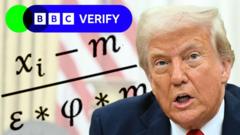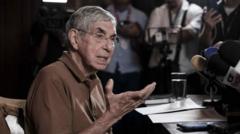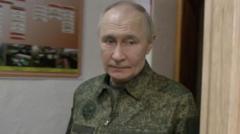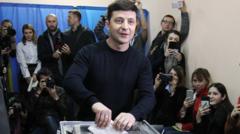Former President Donald Trump has ignited controversy with his recent assertions about Ukraine's responsibility for the ongoing war with Russia. His comments, viewed by many as aligning with Russian narratives, have prompted fact-checking and responses from Ukrainian officials, including President Volodymyr Zelensky, who criticized Trump for perpetuating misinformation.
Trump’s Controversial Claims on Ukraine and the War with Russia
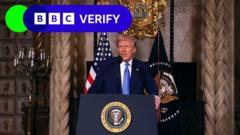
Trump’s Controversial Claims on Ukraine and the War with Russia
As Donald Trump makes bold assertions regarding Ukraine's role in the war with Russia, fact-checkers scrutinize his statements amid ongoing conflict discussions.
Article text:
Former President Donald Trump has stirred significant debate with his recent statements regarding Ukraine’s role in the ongoing conflict with Russia. Speaking from his Mar-a-Lago estate in Florida, Trump accused Ukraine of being responsible for the war and made claims concerning President Volodymyr Zelensky's approval ratings and the absence of elections amid martial law imposed by the ongoing conflict. These remarks were further amplified on his Truth Social platform, where he asserted that Zelensky is a "dictator without elections", despite the fact that elections have been suspended due to martial law implemented following Russia's invasion in February 2022.
Trump's allegations seem to echo narratives commonly propagated by the Kremlin, particularly in the context of questioning Zelensky's legitimacy as Ukraine's leader. Zelensky's first term began in 2019 and is set to expire in May 2024. Independent evaluations of the presidential election indicated that it was competitive, with Zelensky securing a notable 73% of votes during the run-off. Zelensky has committed to holding elections once the conflict subsides, although experts warn that organizing elections amid active hostilities would be almost impossible, given the ongoing Russian advances and the displacement of millions of Ukrainians.
In the wake of Trump’s comments, Zelensky criticized the former president for living in a "disinformation space" orchestrated by Russian narratives. Trump also claimed that Zelensky’s approval rating had plummeted to 4%, sparking skepticism. Although official polling is scarce during wartime, a recent survey indicated that 57% of Ukrainians still express confidence in their leader, despite a decline from previous high figures.
Moreover, Trump questioned why Ukraine was absent from recent US-Russia negotiations in Riyadh and implied that Kyiv should have resolved the conflict in a more timely manner. He echoed claims made by Kremlin officials, asserting that Ukraine had started the war. This notion contradicts the historical context that Russia initiated the full-scale invasion in 2022 after several aggressive acts, including the annexation of Crimea in 2014.
As fact-checkers examine Trump's assertions in light of the ongoing war, both domestic and international scrutiny mounts over his statements that seem to align with Kremlin propaganda. The implications of Trump's remarks raise questions about the narrative surrounding the conflict and the potential impacts on international perceptions of Ukrainian leadership and agency in the ongoing crisis.
Former President Donald Trump has stirred significant debate with his recent statements regarding Ukraine’s role in the ongoing conflict with Russia. Speaking from his Mar-a-Lago estate in Florida, Trump accused Ukraine of being responsible for the war and made claims concerning President Volodymyr Zelensky's approval ratings and the absence of elections amid martial law imposed by the ongoing conflict. These remarks were further amplified on his Truth Social platform, where he asserted that Zelensky is a "dictator without elections", despite the fact that elections have been suspended due to martial law implemented following Russia's invasion in February 2022.
Trump's allegations seem to echo narratives commonly propagated by the Kremlin, particularly in the context of questioning Zelensky's legitimacy as Ukraine's leader. Zelensky's first term began in 2019 and is set to expire in May 2024. Independent evaluations of the presidential election indicated that it was competitive, with Zelensky securing a notable 73% of votes during the run-off. Zelensky has committed to holding elections once the conflict subsides, although experts warn that organizing elections amid active hostilities would be almost impossible, given the ongoing Russian advances and the displacement of millions of Ukrainians.
In the wake of Trump’s comments, Zelensky criticized the former president for living in a "disinformation space" orchestrated by Russian narratives. Trump also claimed that Zelensky’s approval rating had plummeted to 4%, sparking skepticism. Although official polling is scarce during wartime, a recent survey indicated that 57% of Ukrainians still express confidence in their leader, despite a decline from previous high figures.
Moreover, Trump questioned why Ukraine was absent from recent US-Russia negotiations in Riyadh and implied that Kyiv should have resolved the conflict in a more timely manner. He echoed claims made by Kremlin officials, asserting that Ukraine had started the war. This notion contradicts the historical context that Russia initiated the full-scale invasion in 2022 after several aggressive acts, including the annexation of Crimea in 2014.
As fact-checkers examine Trump's assertions in light of the ongoing war, both domestic and international scrutiny mounts over his statements that seem to align with Kremlin propaganda. The implications of Trump's remarks raise questions about the narrative surrounding the conflict and the potential impacts on international perceptions of Ukrainian leadership and agency in the ongoing crisis.


